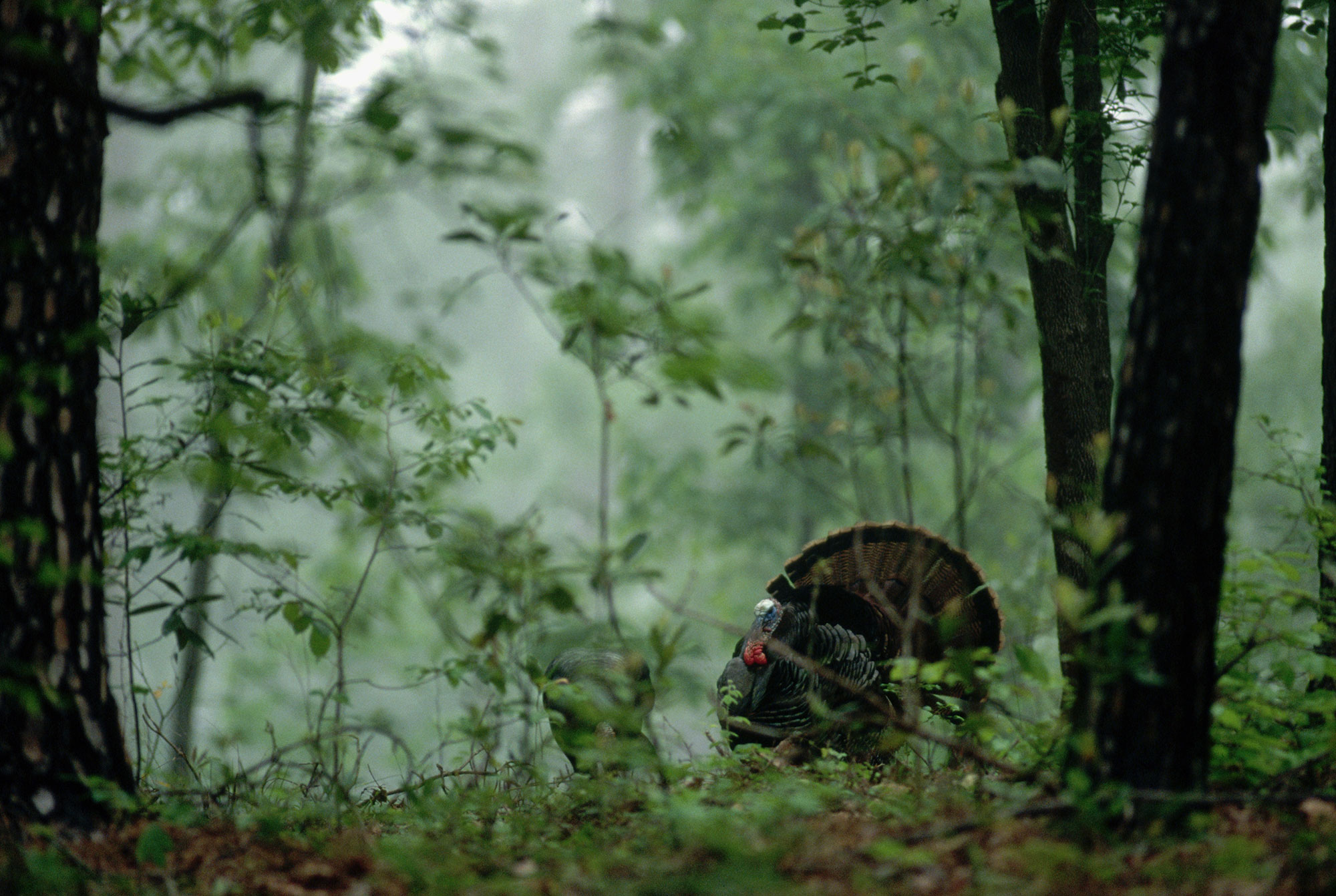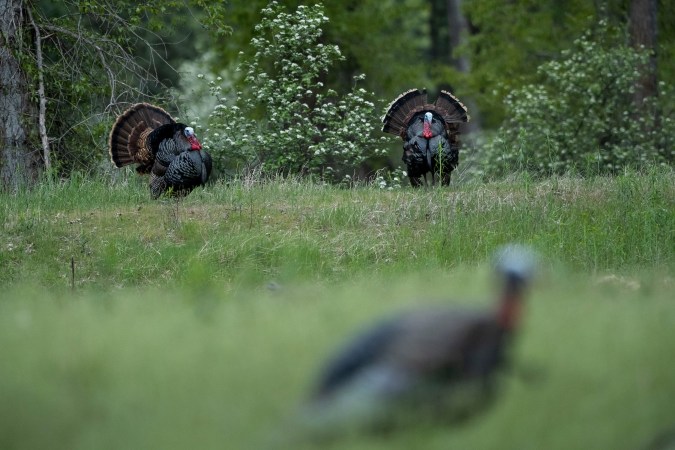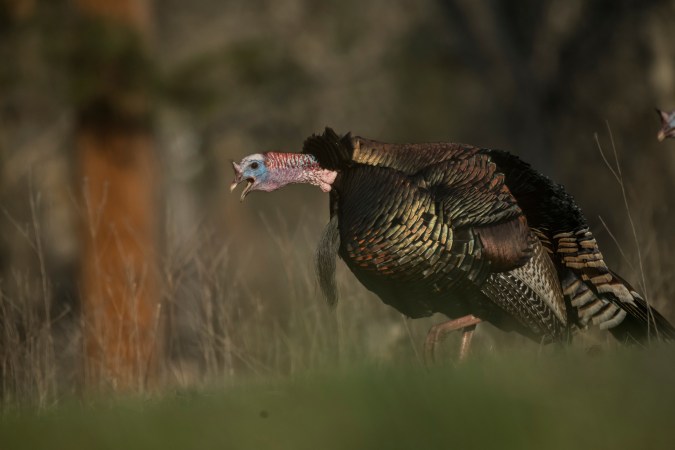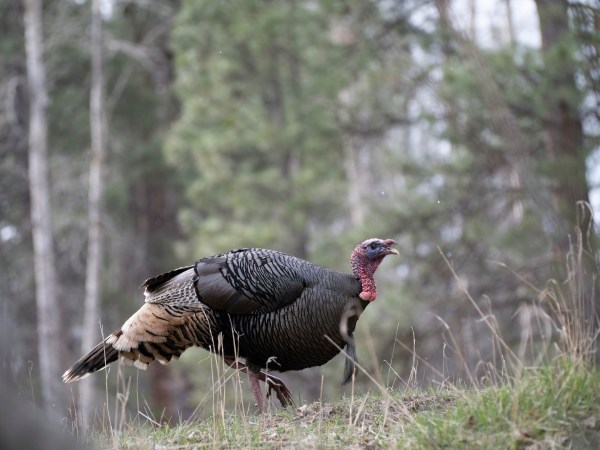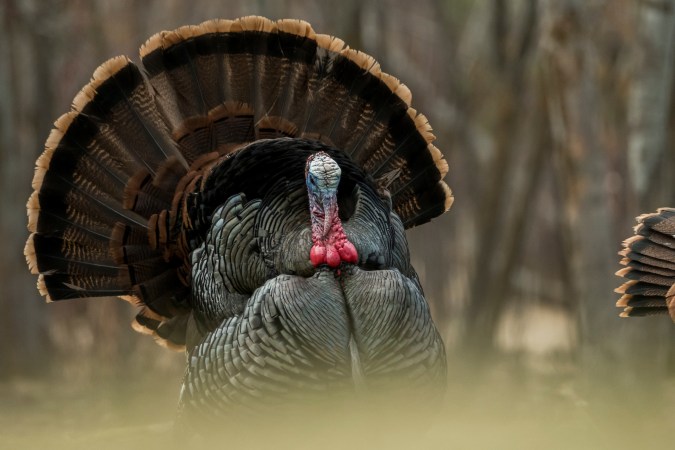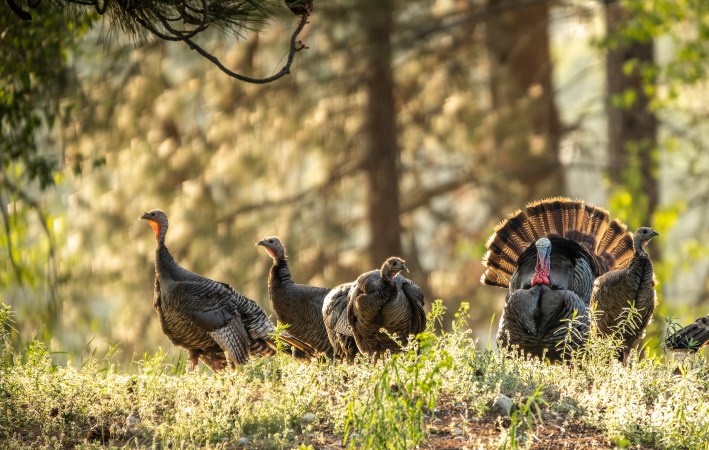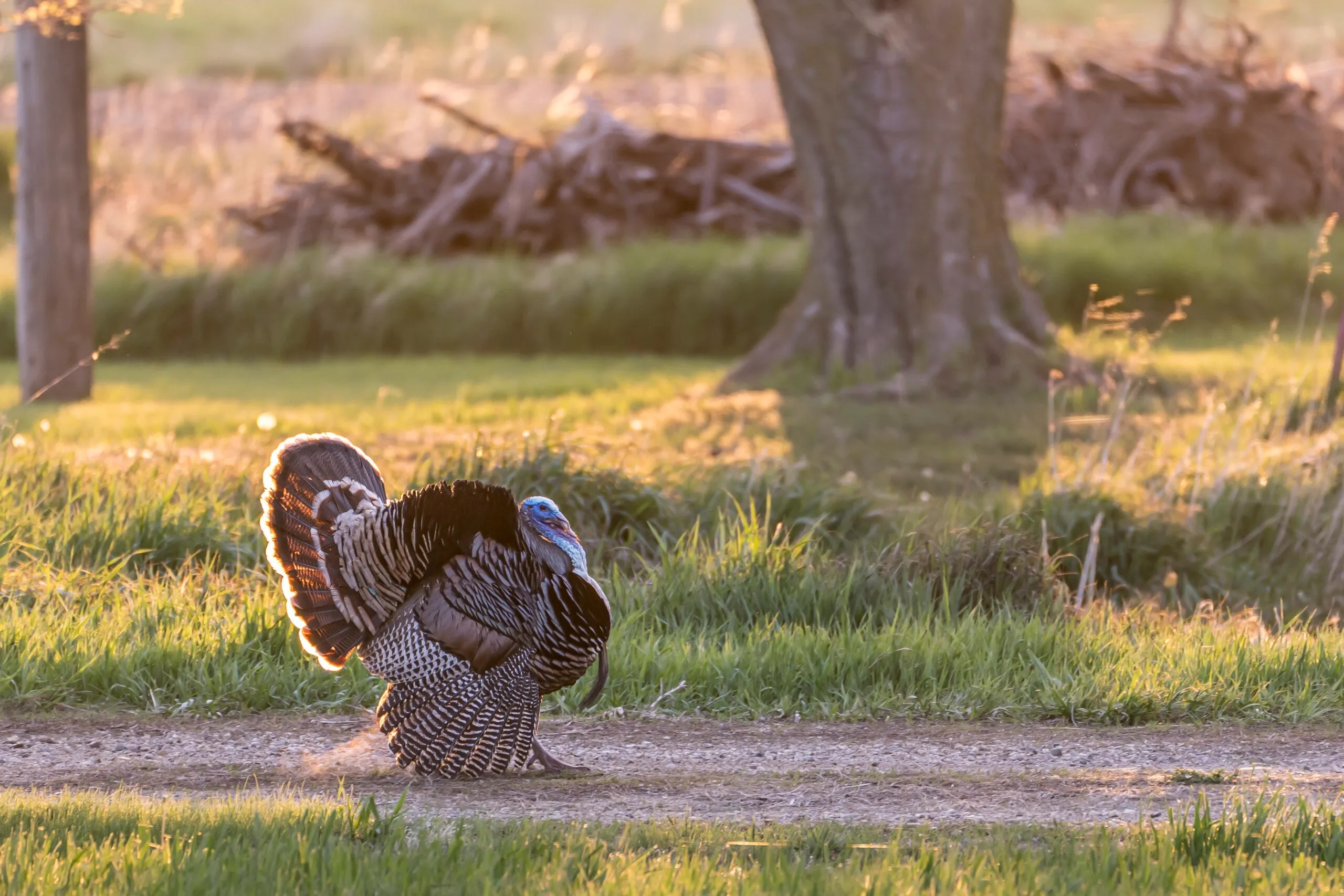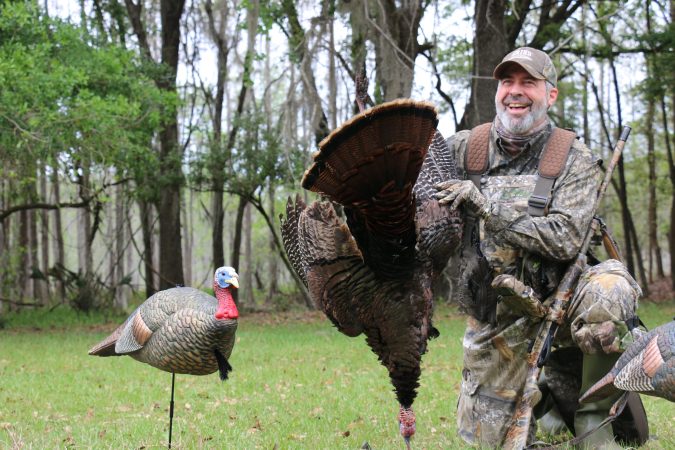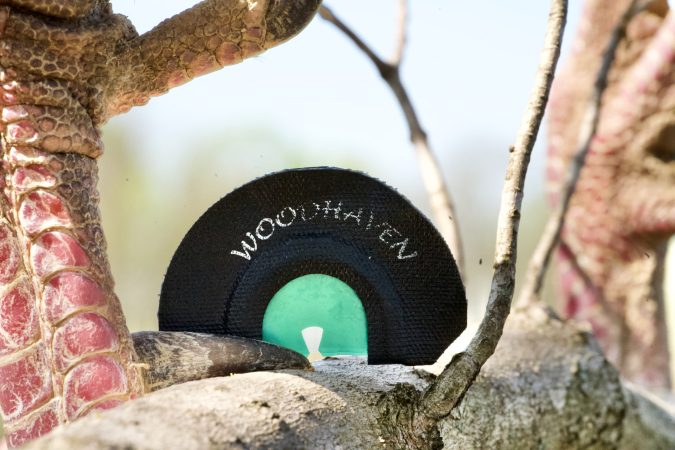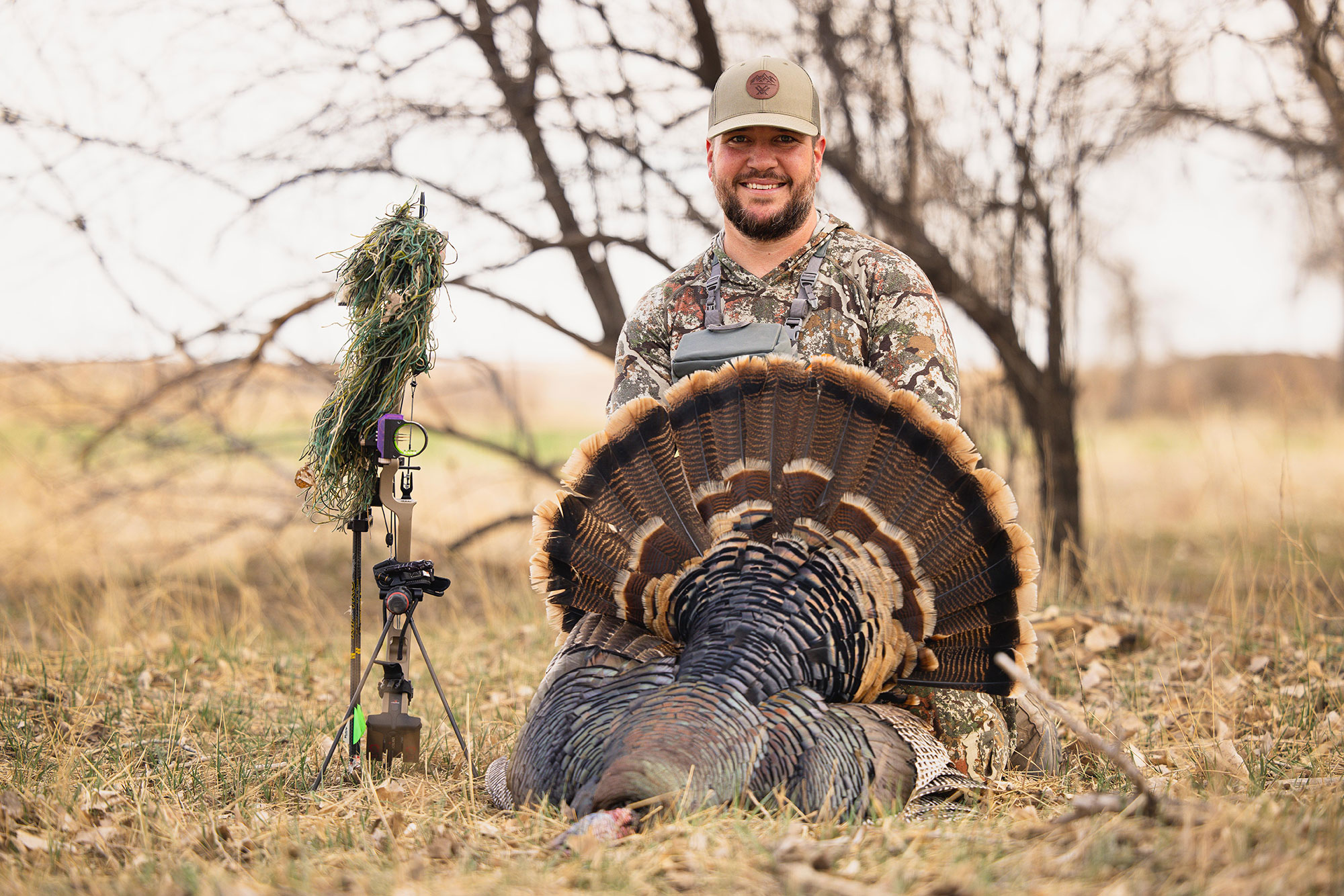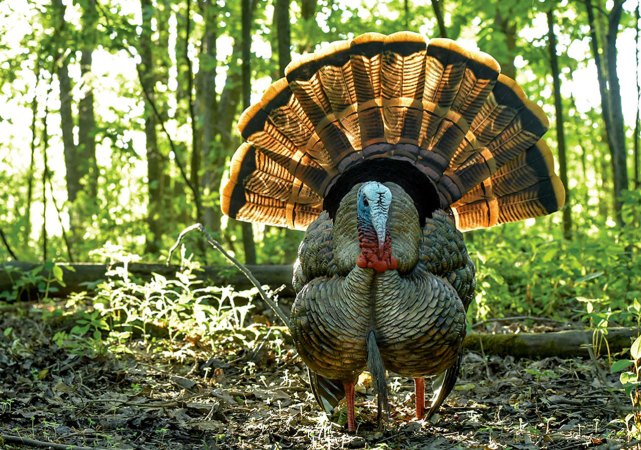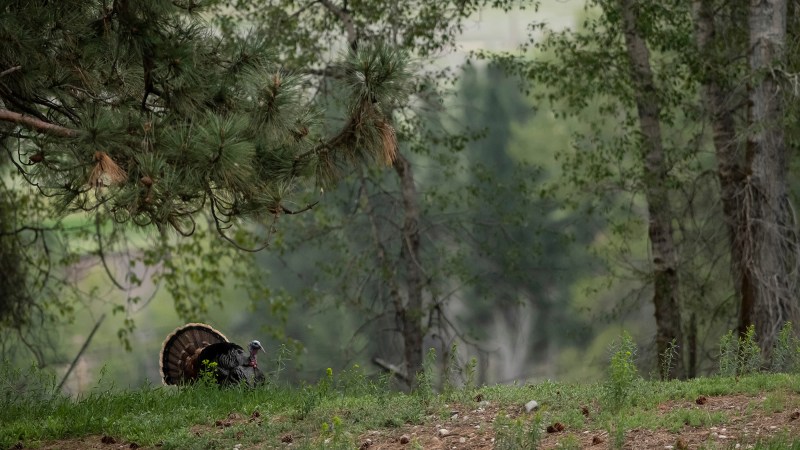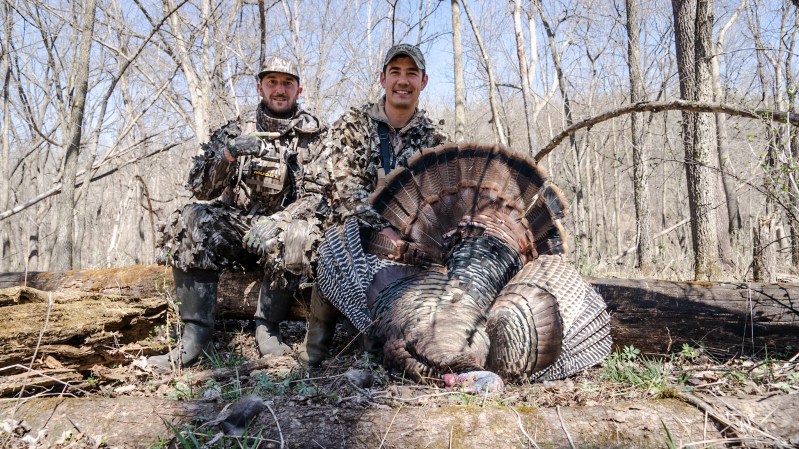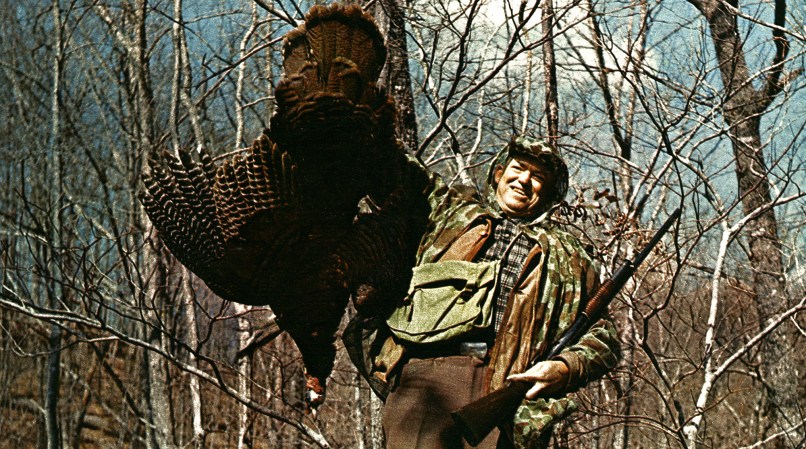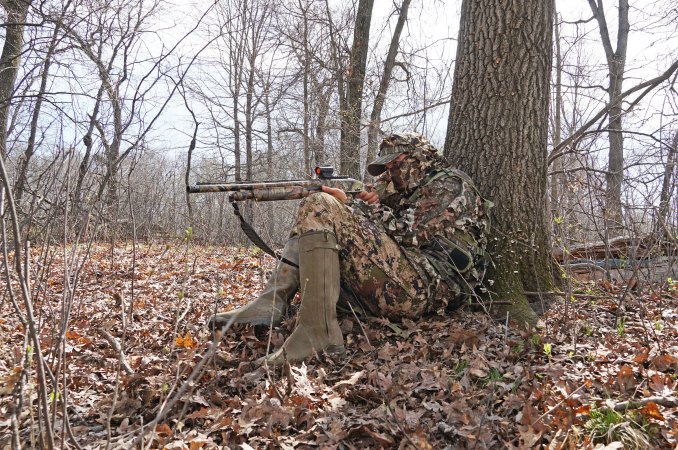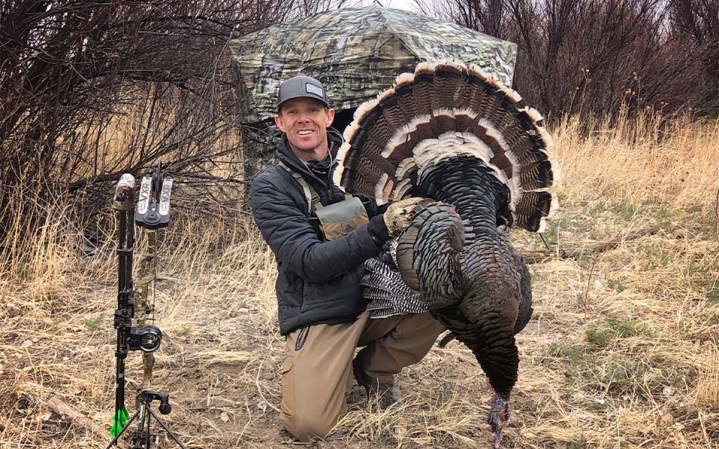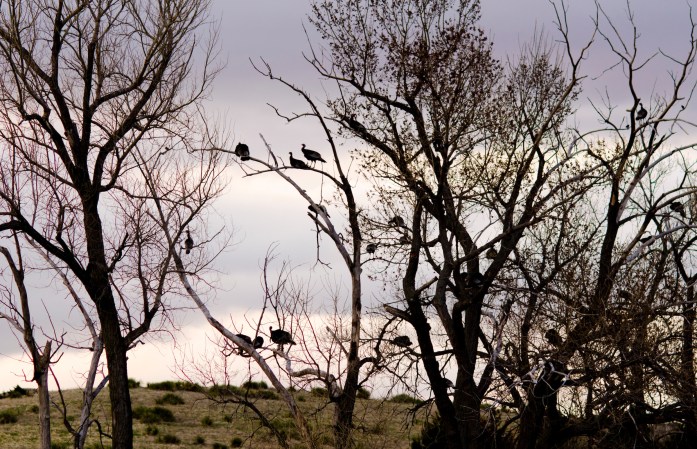Few things in hunting rival the excitement of a tom turkey’s thundering gobble from the limb before first light. When that gobbler finally struts into range and you make a perfect shot, you will have accomplished one of the greatest and most thrilling hunts in America. Plus, you’ll have a whole bunch of delicious wild turkey meat to bring home.
But leaving the woods with a longbeard draped over your shoulder requires specific skills, knowledge, and plenty of patience. To be successful, you’ll need a basic understanding of turkey behavior and calling, along with a few pieces of crucial gear. We’re here to help. In this ultimate guide on how to turkey hunt, we’ll cover:
- Finding places to hunt turkeys
- Understanding turkey behavior and sign
- Calling turkeys
- Turkey hunting gear
- Turkey guns and shot placement
- Turkey hunting tips
For the most part, turkey numbers are strong and you can chase them almost anywhere in the lower 48. Compared to most big game hunts, turkey hunting is relatively affordable. If you’re new to hunting in general, turkey hunting provides a thrilling and accessible way into the sport. Here’s how to get started.
Find Places to Turkey Hunt
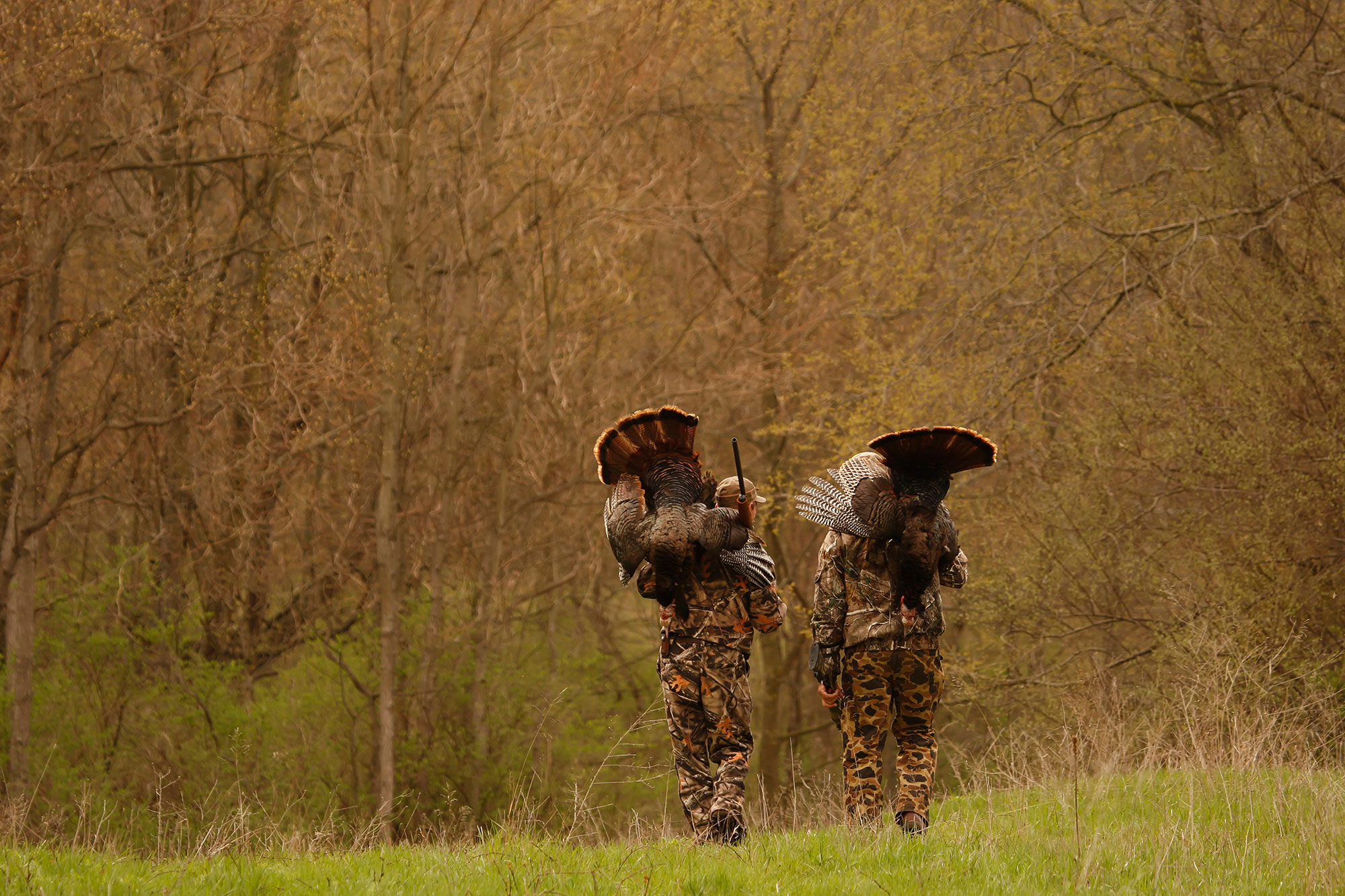
Turkeys thrive in diverse habitats all across the country, but they do require a few key habitat ingredients. First and foremost, turkeys require trees for roosting. Think old-growth hardwood, pine forests, or giant cottonwoods in open country. Turkeys like to feed in open areas during the day: agricultural fields, meadows rich with bugs, and clear-cuts shooting up new growth. Lastly, turkeys need thick, grassy areas for nesting cover.
Search your state’s website and you’ll likely find a distribution map for turkeys. Once you have a general understanding of where turkeys live, you’ve got to find a place to hunt them. That breaks down to either private or public land.
Private Land
For new turkey hunters, getting access to private land is the perfect training ground, especially if you’re the only one hunting it. You might have neighbors, friends, or family with prime turkey habitat, which is where you should start first. The larger the property, the better. This will give you (and the turkeys) plenty of space to roam, but any spot is better than none.
You can also go the paid route by leasing ground from an individual or timber companies, but this can get expensive. Joining a local hunting club or camp is another option.
Public Land
If you can’t get access to private hunting ground, there are still plenty of opportunities on public land. It’ll just require a little extra scouting and legwork to avoid other hunters. You’ll need to check your local hunting regulations, but most of the following land designations allow turkey hunting:
- State forests
- Wildlife management areas
- State natural areas
- National forests
- National wildlife refuges
- Bureau of Land Management lands
There are also many private lands that allow public hunting access:
- Walk-in areas
- Voluntary public access areas
- Logging company owned lands
- Conservation easements
- Managed forest lands
GPS mapping systems like OnX or Huntstand can help you locate potential hunting spots (read our guide to hunting public land turkeys here). Since you’ll be competing with other hunters, look for areas on a map with a variety of terrain features that aren’t easy to access. This includes areas that are far from parking, areas that require crossing a stream or wetlands, or areas on the backside of steep ridges. These natural barriers will keep out many other hunters. Look for open timber that borders private agricultural fields or pasture land that’s located at least half a mile or more from a trail or road. Find these spots and you can usually find turkeys. Spend as much time scouting before the season as you can, and read our guide on how to scout for turkeys.
Understanding Turkey Behavior
Because spring turkey hunting seasons coincide with turkey breeding season, hunting tactics revolve around calling in male turkeys (toms) with female turkey (hens) noises. Toms gobble and strut to entice receptive hens. This dance drives the main activity in spring turkey hunting.
READ NEXT: Turkey Vision: Here’s What Hunters Should Know About How Wild Turkeys See
Identifying Toms, Jakes, and Hens
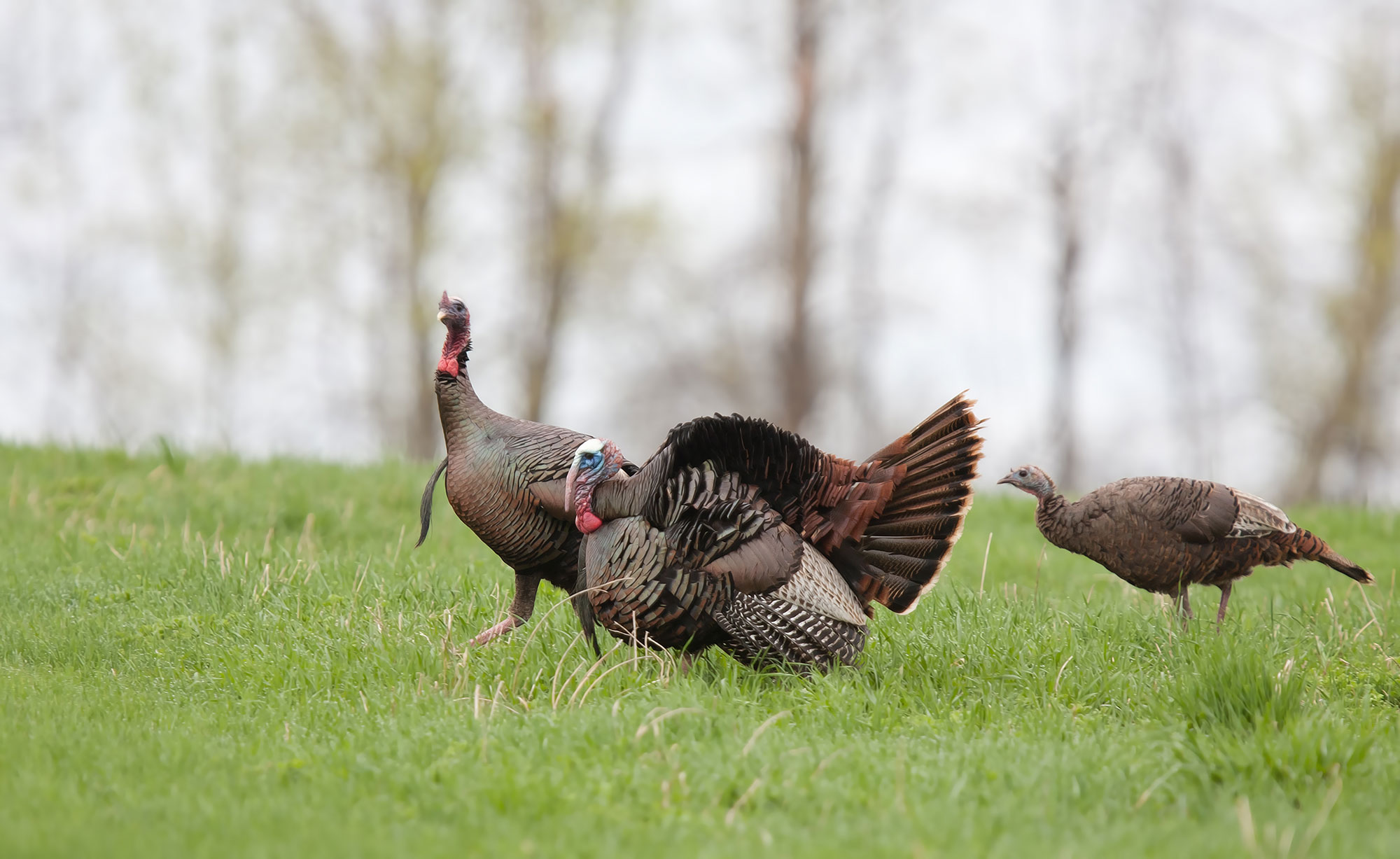
Toms are adult male turkeys. They have full tail fans and long beards (typically 8 inches or longer). They are also larger in body size (usually 15 to 25 pounds).
Jakes are subadult male turkeys. Their tail fans will typically have some shorter feathers with longer feathers in the middle. They will have shorter beards and smaller body size than toms. Some states allow you to shoot jakes during spring seasons while others do not.
Hens are female turkeys. They typically have no beards (bearded hens are rare but do occur). Hunters are prohibited from shooting hens during spring hunting seasons with the exception that some states allow the harvest of bearded hens.
Basic Turkey Behavior

Turkeys fly up to roost at sunset and fly down sometime around sunrise. Between those two events, turkeys are looking for other turkeys or feed, or they’re trying to breed. They use vocalizations and their excellent eyesight to locate other turkeys.
Roosting
All turkeys roost during the night. Ridge tops, creek bottoms, field edges, and isolated woodlots make great roosting sites. During inclement weather, turkeys will roost in more protected areas.
Gobbling

Gobbling is a tom’s deep, raspy calling card and the main reason they’re so exciting to hunt. Toms use this rapid rolling vocalization to locate nearby hens. Gobbling frequency varies widely depending on the number of hens in the area and hunting pressure.
Strutting
To attract hens and establish dominance, gobblers will strut and show off their plumage. Strutting will sometimes draw in another gobbler as a challenger.
Spitting and Drumming
Besides gobbles, spitting and drumming are the other common sounds gobblers make. Spitting literally sounds like someone aggressively spitting. If you can hear this sound, get ready, because it means a gobbler is close. Drumming sounds like a low, quiet drum rumbling in the woods. You feel a tom drumming in your chest more than you actually hear it.
Hen Vocalizations

The female turkey dictates tom behavior and can make or break your hunt. When hens are ready to breed, prying a gobbler away from them is a real challenge. Hens call to locate gobblers and each other with a variety of vocalizations.
- Yelps are the most common vocalization. Yelps are a series of high pitched sounds that hens use to locate gobblers. Gobblers can also yelp, but the sound is most commonly produced by hens.
- Clucks are short notes turkeys use to locate or get the attention of other turkeys. Basically, it’s the sound they make when they’re looking for the party.
- Cutts contain a series of sharp, loud clucks interspersed with yelps. This communicates that a turkey is excited, and it is an effective calling sequence for getting a gobbler to talk when soft purrs or yelps won’t cut it.
- Purrs are soft, rolling sounds hens often make while feeding. This is often referred to as a contentment call, which communicates to other turkeys that they are at ease or unalarmed.
- Cackles consist of a series of cluck-like sounds that increase in pitch. Hens typically produce these sounds when they’re flying down or up to roost.
- Putts are short single notes but with a higher pitch. Turkeys putt when they’re alarmed or suspicious. Putting is usually followed by frantic head bobs and incredible disappearing acts.
Reading Turkey Sign
Turkeys aren’t the heaviest animals, so don’t expect to find a copious amounts of tracks when you’re scouting the woods. Tracks will tell you where a turkey has been, but other sign such as dust bowls or drag marks can tell you where they prefer to spend the most time.
Tracks
Turkeys have three toes, and at first glance it can be difficult to know if you’re looking at a gobbler or hen track. Gobblers make larger tracks, and their middle toe is noticeably longer than the other two. Hen tracks run smaller, and all three toes are typically similar in length. A single track might not mean you’ve stumbled on a prime setup, but areas littered with both hen and gobbler tracks might be worth a sit.
Scat
Look for turkey droppings in obvious areas like scratch sites, bare ground, or dirt roads. Gobblers have long j-shaped droppings, while hens have round, clustered droppings. If you find several piles in ideal roosting sites, make a note and plan to give that spot a listen from a distance.
Feathers
Like tracks, feathers will tell you where a turkey has been. One feather might not tell you much, but if you notice multiple, and the area looks like great roosting habitat, it probably is.
Scratching
Turkeys “scratch” or rake back leaves to expose bare ground and feed on insects or mast. These spots look like miniature deer scrapes, scattered randomly in a given area where turkeys have been feeding. If they’re fresh enough, you can see marks where their feet raked through the dirt.
Strut Zones
A lot of the same terrain features that make great roosting sites also make excellent strut zones. These are easier to identify in field edges by glassing them from a distance. They can also be great ambush sites for henned-up or unresponsive gobblers. On dry, sandy, or muddy ground, gobblers will leave thin parallel lines where their wing tips drag the ground while they strut. While he might not strut in that spot every day, it’s probably an area he tends to frequent.
Dust Bowls
Turkeys “bathe” by rolling or crouching in dirt patches to coat their wings and maintain their plumage. This also helps them get rid of parasites or biting insects. Dusting sites look like small, round indentations or bowls in the dirt that usually have turkey feathers in them.
Calling Turkeys
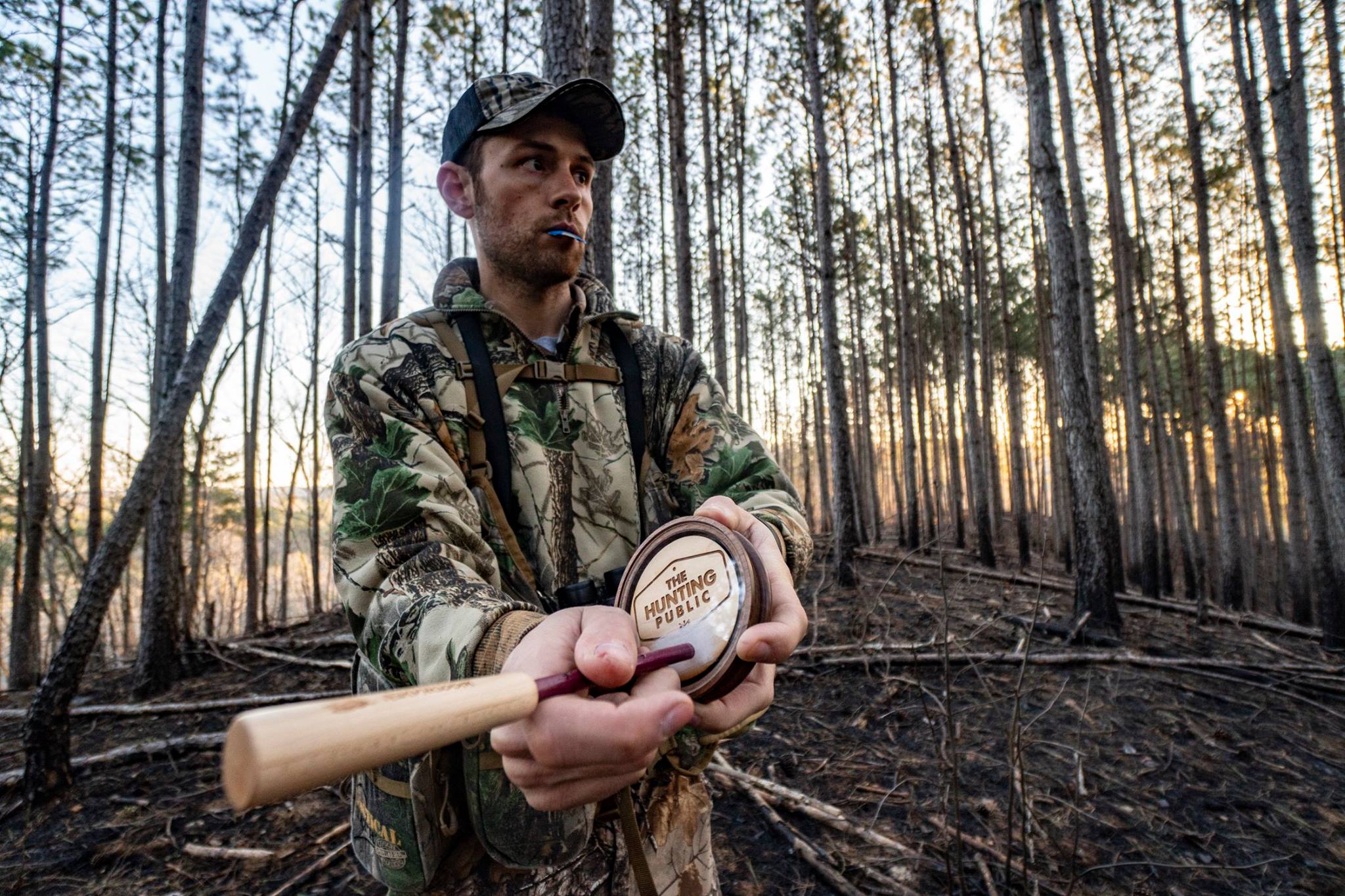
Turkey hunting is an auditory sport; you’ll use your ears as much as your eyes. You’ll learn to hear gobblers from a distance and pinpoint their location. You’ll sneak closer to those toms and then call them into range. But first you need to learn how to call, and for that you’ll need a turkey call.
There are plenty of options when it comes to turkey calls. At the beginning, focus on producing consistent, crisp yelps. Using a box call is the easiest and quickest way to get started. Get comfortable and proficient with one call, and then add more later. The main types of turkey calls include the following.
- Box calls have a square sound chamber (box) with a lid that you drag across the top edge of the box to create sound through friction. These are typically the easiest calls for beginners to use, and they can produce a wide range of volume, making them extremely versatile and effective.
- Mouth calls, or diaphragms, usually require the greatest learning curve. They are small, semicircle frames covered with tape that houses a thin piece of latex at the center. You create sound by pushing the call against the roof of your mouth with your tongue and forcing air over the latex. This part requires the most trial and error, and videos provide great insight for learning how to use them. The most important thing to understand is that all mouths (and all mouth calls) are not created equal. One call that works great for your buddy might not work at all for you. Prepare to buy several before finding one that works for you.
- Friction calls utilize a round sound chamber, or pot, and a striker that you drag across the call’s surface to create sound. The most common surface materials include glass, slate, and crystal, and each have their own advantages. You can easily manipulate the sound and pitch of friction calls by applying different amounts of pressure to the surface or angling the striker.
- Locator Calls like crow, coyote, woodpecker, and owl hoots can “shock” turkeys into gobbling. Locator calls help you pinpoint a gobbler without running the risk of calling them in when you’re not ready or educating them.
Turkey Calling Tips

Becoming an efficient turkey caller requires years of practice, trial and error, and lots of time spent listening to live turkeys. Practice your calling well before the season at any chance you get. Carry a mouth call in your pocket and practice on your work commute.
Calling videos on Youtube will help you learn, but the real trick is to spend a lot of the time in the woods talking to turkeys. This is the general process.
Roost a Gobbler
Before you make the first call, you want to locate a turkey. Ideally, you’ll do this the evening before you hunt. Listen for turkeys from a distance: They’ll usually gobble once or twice after they fly up. If the turkeys aren’t gobbling on their own, you’ll want to use a locator call to shock them into gobbling. When you hear turkeys on the roost, plan to setup in that area the next morning.
If you aren’t able to roost a tom the evening before, don’t sweat it. Plan to be in the woods at least 30 minutes before daylight within listening range of where you think turkeys might be roosted. That way, you’re still in earshot of a gobbler and you can adjust your setup on the fly.
Set Up Properly
You want to set up as close as you can to a gobbling tom without bumping him. In open woods this might be 200 yards away or more. In thicker cover you might be able to slip inside 100 yards. On your first few turkeys it makes sense to err on the side of caution and set up farther away from the bird. Pick an area that gives you a good shooting lane, with at least 40 yards of open woods or field. Sit with your back to a tree that is at least as wide as your shoulders (to break up your profile). Rest your shotgun on your knee pointing in the direction you expect the turkey to come from. Now you can begin calling.
Call with a Strategy
Half of turkey calling is about sounding realistic and the other half is about reading a tom’s attitude. An unpressured, lonely tom will gobble often and be receptive to more aggressive calling. But if you’re targeting a tom that has already been pressured by other hunters, a few soft clucks and purrs will likely be more effective. No two gobblers respond the same, so expect each encounter to require a slightly different calling strategy.
Calling Frequency
Most new hunters call too often. You want to pique a gobbler’s interest, and then get him to come looking for you. This takes patience. If a gobbler is occasionally responding to your call’s, it’s tempting to call more and more. Instead, you should probably ease off the call and wait. It could take an hour or more for a gobbler to decide to come into range, and when he does, he’ll likely come in silently.
On the flip side, some gobblers will respond to your calls and charge in hot. Call aggressively for these birds, then immediately go quiet and get ready for a shot.
Knowing when and how much to call is a delicate balance, and you’ll get it wrong before you get it right. More encounters in the field will help you find the right rhythm. Pay close attention to how a turkey is responding to you, and try to tell him what he wants to hear.
There are two general approaches you can take to calling: running and gunning, or sitting and waiting. For run-and-gun hunting, you’ll cover ground, stop to call on occasion, and hope to strike a bird. But even this strategy takes a lot of patience. You’re not literally running through the woods. You walk very slowly and stop at likely spots to set up and call. Give each setup at least an hour of waiting and occasional calling before moving to a different spot. The call-and-wait strategy is more simple. Set up in a spot where you’ve seen turkeys or where there’s a lot of turkey sign, and then simply wait until a tom arrives. Call every 15 or 30 minutes or when you hear a gobbler. This strategy is usually best executed from a blind (because it’s more comfortable and it conceals you better). Both strategies come with pros and cons. Sitting and waiting is usually more productive for new hunters (because you’re less likely to bump turkeys), but it can get a little boring. Running and gunning is more engaging, but it requires a ton of trial and error to master.
Read Next: Turkey Calling Tips
Basic Turkey Hunting Gear
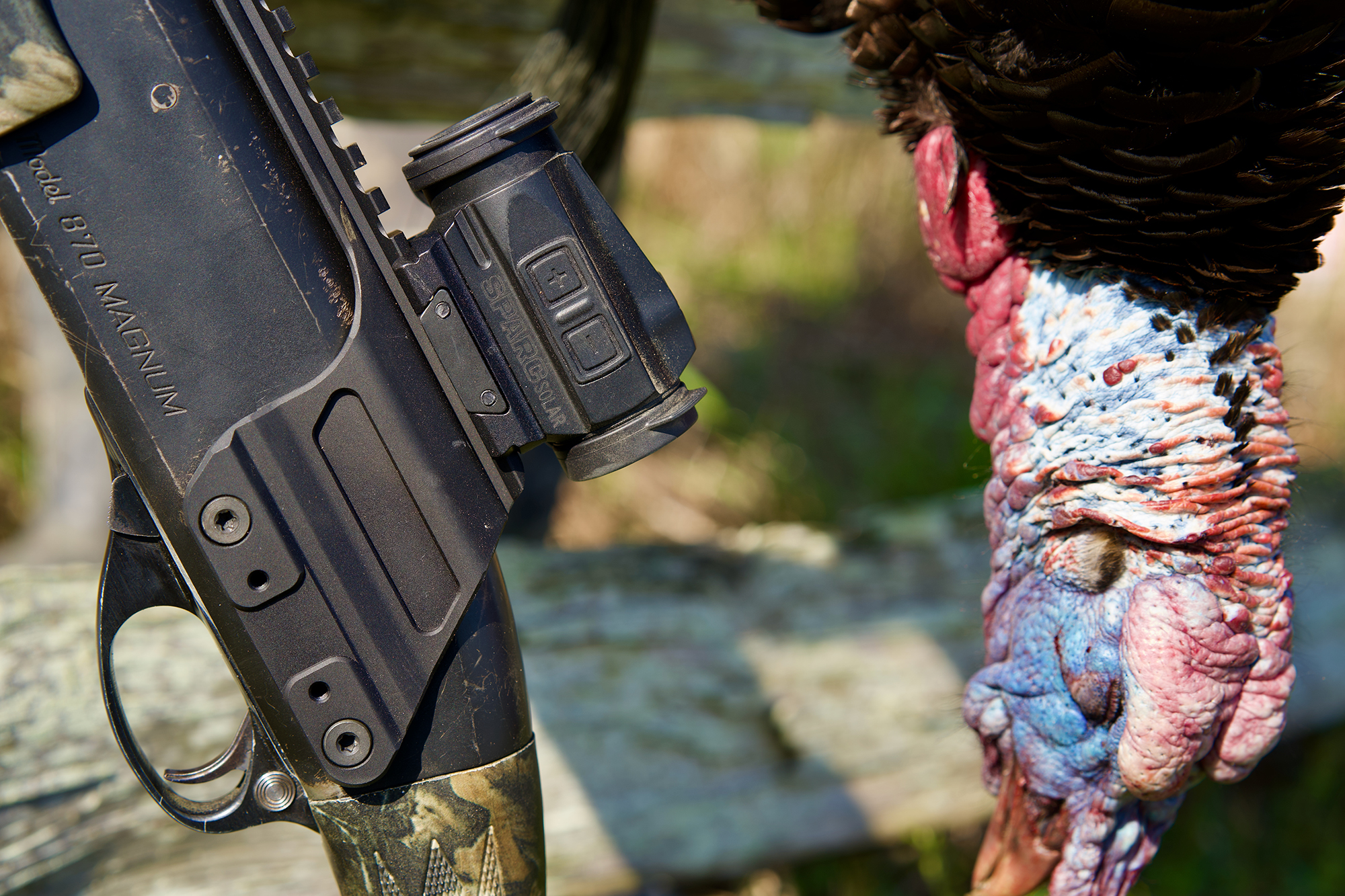
When it comes to gear, you can make turkey hunting as minimalist or maximalist as you want. At the minimum, you’ll need some camo clothing, a shotgun that will shoot a tight pattern, ammo, and a call. Beyond that, you can invest in gear that makes your hunting more comfortable and efficient. Check out my essential guide to turkey hunting gear here. But the essentials include:
- Turkey hunting shotguns
- Turkey loads
- Turkey choke
- Turkey hunting camo
- Turkey calls
- Turkey decoys
- Turkey vest
- Insect repellant
- Hunting binoculars (optional)
- Turkey hunting boots
Turkey Guns and Loads
Hunters killed plenty of longbeards before turkey-specific shotguns and TSS turkey loads became popular. But the advent of that technology has (theoretically) made turkey hunting more efficient and accurate. If you already have a shotgun, it’s probably just fine for hunting turkeys. Run a full choke, use quality turkey loads, and make sure to shoot within your effective range (more on this later). But if you’re looking for a turkey-specific gun, here a few things to consider.
- Barrel length: Many turkey hunters prefer shorter (24-inch or less) barrels that are easier to maneuver in the woods.
- Choke tubes: Turkey chokes constrict your shotgun pattern. Since you’re aiming at the turkey’s neck, you want dense patterns (meaning a lot of pellets striking within a 10-inch circle). Running a turkey-specific choke will help increase pattern density. Just make sure to read your shotgun owner’s manual and select the right choke system when choosing an aftermarket choke. Read our review of the best turkey chokes here.
- Action: Pump-action shotguns dominate the turkey woods for their simplicity and reliability. Semi-autos are useful for their recoil-reducing systems and fast follow-up shots.
- Sights: A simple bead sight is ok for close and mid-range work (about 30 yards). When shooting farther you’ll want iron sights or a red dot sight for more precise aiming. Here’s a full rundown of the best sights for turkey hunting.
Patterning Your Shotgun
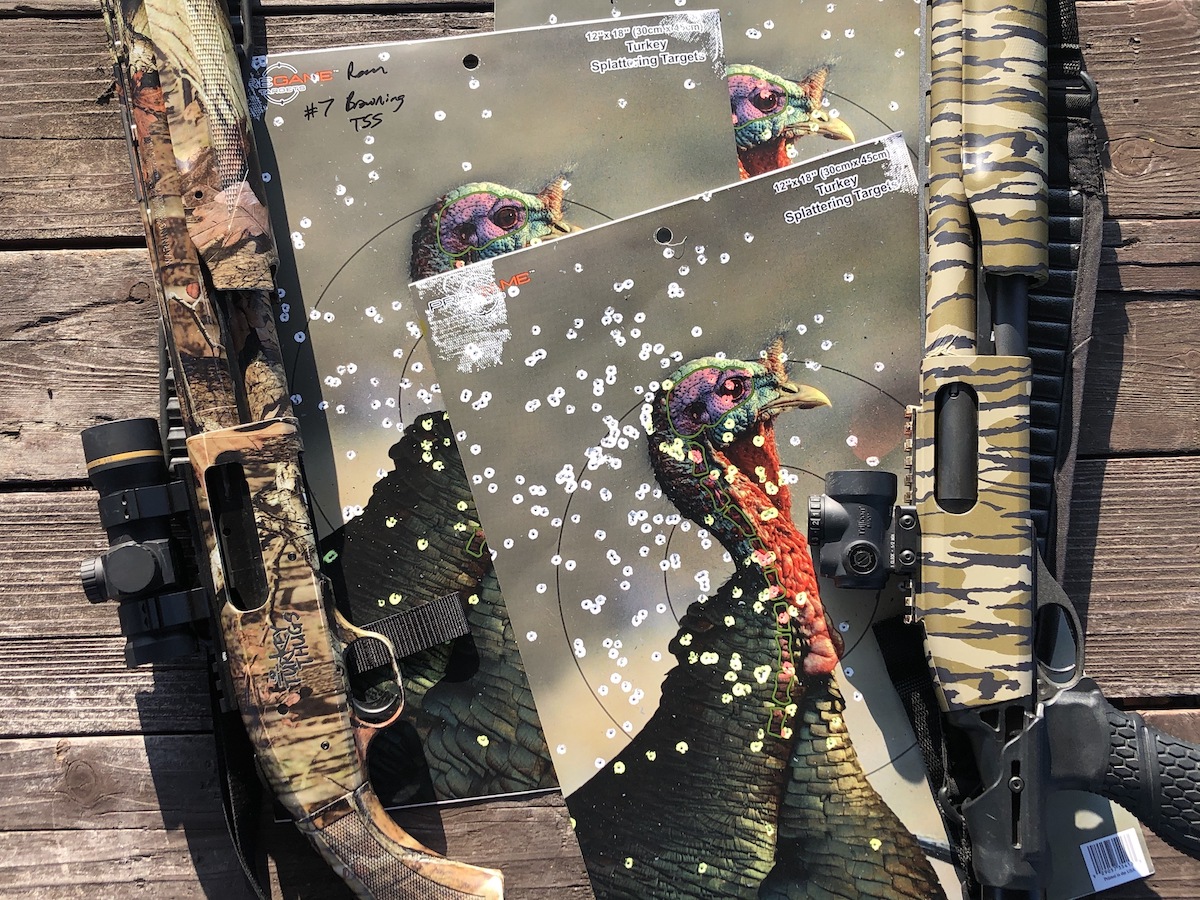
Once you’ve got your gun and ammo, it’s time to pattern your setup. This means shooting your gun at a target to evaluate its point-of-impact and pattern density (how many pellet strikes) at a given range. If you’re using a sight, start close—about 15 yards or so—and shoot a paper target. You want the core of your pattern to cover the bullseye. Adjust your sights as needed. If you’re shooting a bead, shoot from about 30 yards to assess your point of impact. If the pattern evenly covers the bullseye, great. If not, you can change your point of impact by using your shotgun’s shim kit (assuming it has one). Or you can throw down for a red dot sight.
Once you’ve got point-of-impact nailed down, you’ll want to assess pattern density. This means counting the number of pellet strikes within a 10-inch circle. A good rule of thumb is that you want about 100 pellet strikes within the circle. Once you’re at a distance where you can no longer get about 100 hits inside the circle, you’ve identified your maximum effective range.
Shot Placement
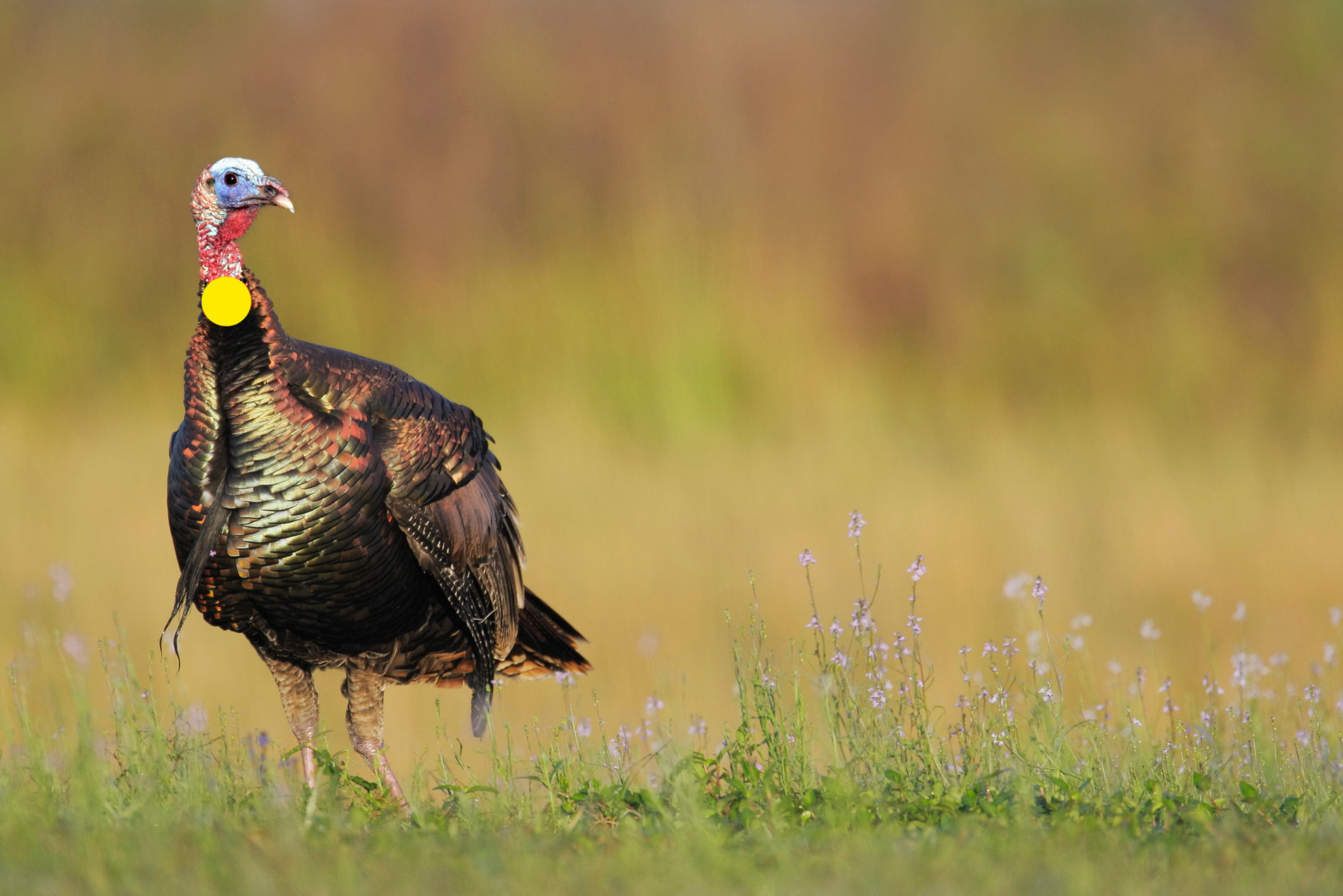
You want your pattern to strike the turkey in the neck and head. Aim for the point where his red wattles meet feathers on his neck. Avoid shooting at a turkey when he is in full strut since this decreases your chance of hitting him in the neck. Likewise, avoid shooting turkeys in the body, as this is likely to wound the bird. Read our full guide on where to shoot a turkey here.
Turkey Hunting Tips
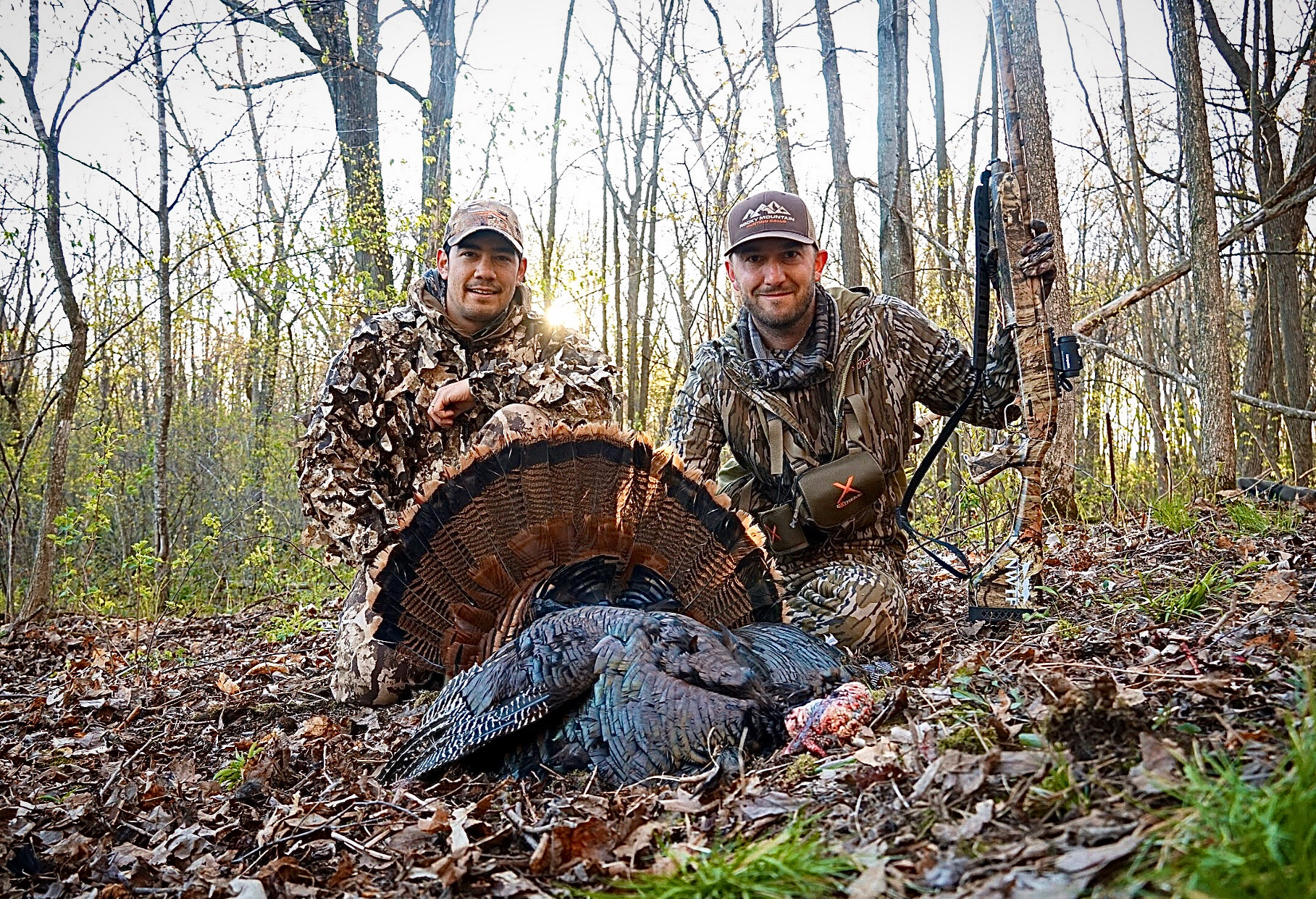
- Sit still. Turkeys have incredible vision and can spot movement from hundreds of yards away.
- Be safe. Avoid using tom or jake decoys on public lands and always keep decoys in a bag when walking through the woods. You don’t want other hunters to mistake your decoys for the real thing. Remember that there are other turkey hunters in the woods using calls and decoys. Be 100 percent certain of your target before shooting. If you bump into hunters in an area you were planning to target, just move to a different spot.
- Walk slowly. Many new hunters walk too fast through the turkey woods. Moving slowly allows you to listen while you walk. If you hear a gobbler, head in that direction.
- Be ready to shoot. Pressured tom turkeys will often come in silent to a call. They’ll show up for an instant, look around, and then disappear. If a tom is in range and you’ve got a good shot opportunity, take it!
- Keep your head on the gun. Many new (and old) turkey hunters miss because they pull their head off the gun right before pulling the trigger. This often throws the shot high. Stay down on the gun and squeeze the trigger.
- Keep your calling simple. You can kill turkeys with a few hen-like yelps. You can’t kill turkeys with a full orchestra of crappy calling. So when you’re just starting out, focus on simple yelps and clucks.
- Be ready for bugs. The downside of spring turkey hunting is that it happens during the heart of tick season. Ticks carry all kinds of bad diseases that turkey hunters know all too well. Treat your turkey hunting clothes with permethrin and wear the best tick-proof clothing you can find.
- Know what to do with your bird. Once you punch your turkey tag you’ll need to know how to butcher your bird. Check out our complete guide on how to butcher a turkey.
Becoming a Turkey Hunter
Great turkey hunters understand turkey behavior and how to adapt throughout the season. But it takes years to really learn how to turkey hunt. Turkeys are highly instinctive animals. There’s often no logic behind what they do or why they do it. That’s in part what makes it so fun. You’ll have to hone your hunting instincts to be a successful turkey hunter.
Stick with it, and after several red-eyed spring hunting seasons you’ll find that the turkeys are actually calling you—and you’ll answer the call every time.

